A satisfactory Microsoft Advertising user experience benefits both the advertiser and the consumer. To achieve a win-win, please make sure that you follow the relevance and quality policies specified on this page. These requirements focus on four core aspects of your campaign that affect user experience: keyword relevancy, ad copy, landing page and website user experience, and the quality of the landing page and site content.
How do the policies affect your ad distribution?
- Advertisers with more relevant keywords and higher quality ads and landing pages are usually rewarded with more prominent ad positions or a lower cost-per-click (CPC).
- Less relevant keywords or low-quality ads and landing pages might result in less favorable ad positions or a higher CPC.
- In some cases, the ad might not appear at all. Please check the "Marketplace Exclusion" section below for scenarios in which ads or sites may be completely excluded from the marketplace.
System quality
To ensure a positive user experience, and maintain ad and network quality, we may deactivate or delete accounts that have been inactive for over 15 months, or remove non-performing keywords and ads from our platform. We also reserve the right to limit the amount of keywords and ads that you upload or retain at any given time. In addition, we reserve the right to restrict ads serving on keywords in the following categories:
- Weapons
- Adult
- Pharmaceuticals
- Gambling
- Trademark (this does not apply to trademarks owned by the advertiser)
Keyword relevancy
Using the right techniques in choosing keywords and building ads not only promotes user engagement, but it also helps maintain the ROI of the market for all advertisers.
Keywords should be relevant. This means your site should be a satisfactory destination for users, based on a primary user intent of the keyword(s) you select.
Your keywords should relate directly to either of the following:
- The specific range of products, services, or content on your landing page.
- The general content, purpose, and theme of your site.
Please note: Extremely popular queries or queries for trending keywords may be subject to a higher standard of relevancy and ads must fully meet the primary user intent of the keywords/queries to be eligible for publication.
Ad copy (title, text, and display URL)
Ads must:
- Be clear, truthful and accurate: Clearly and accurately demonstrate the relevance between your keywords and the product or service you offer in your ad.
- Be correctly written: Ads should be grammatically correct, not include misspellings, and be formatted correctly.
- Manage expectations:Ads should not mislead consumers.
- Ads must be highly relevant to the product, services or information presented on your landing page, or the general content, purpose, and theme of your site.
- When an ad implies that a product is for sale, the landing page must provide the product for purchase.
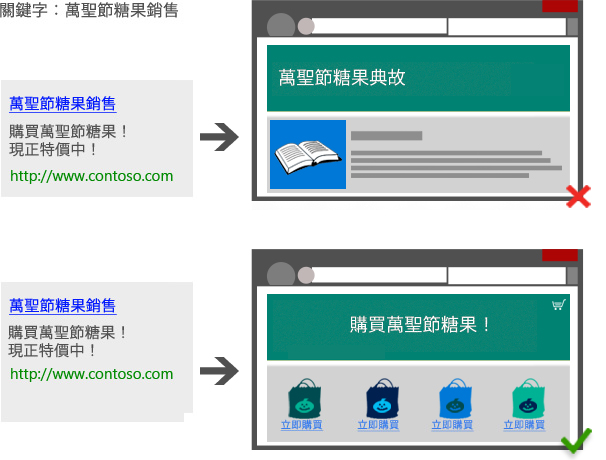
For information about how to format and create your ads, please see our Ad content and style policies.
Ads excluded from the marketplace
Sites may be excluded if their advertising or business practices are found to be potentially malicious, harmful or deceptive or if they consistently violate Microsoft’s policies. For more information, please see the User safety and privacy policies.
The following are examples of sites that may be completely excluded from the marketplace:
- Sites that include viruses, malware, spyware, or other self-installing programs.
- Business models that attempt to mislead site visitors or appear deceptive or fraudulent.
- Phishing sites that try to trick visitors into sharing personal data for fraudulent purposes, such as stealing one’s identity.
- Pages that consist entirely of ads, or whose main purpose is to direct site visitors to ads.
- Link farms.
- Parked domains.
- Sites operated by advertisers who consistently violate our Microsoft Advertising policies or submit large numbers of irrelevant keywords.
Landing page and site user experience
The functions of your site should not obstruct the visitor's normal use or interfere with the user’s ability to navigate. Navigation buttons should operate in a standard and predictable manner, and sites and all parts of the page content should load normally.
If the operations of a landing page meet the descriptions provided below, the user experience it provides may be lower:
- Usage of doorway pages, or cloaking.
- Without obtaining the user's consent:
- Change browser preferences or reset the default home page.
- Resize browser windows or disable browser buttons.
- Generate multiple pop-ups or pop-ups that are used to prevent users from leaving the website.
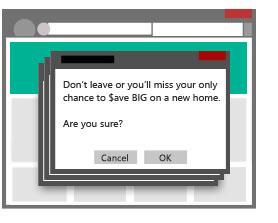
- Fails to load properly or display a “product not available” message.
- Redirect site visitors unexpectedly to unrelated domains.
Low-value user experience:

Higher-value user experience:
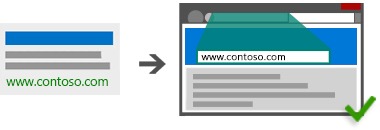
Landing page and site content quality
Generally, we consider content to be valuable if it enables users to find the products, services or information they request easily, or assists users by providing information or shortening their buying or research process. Your landing page should provide clear and direct access to content that is related to your ads and keywords and should not obstruct, delay or confuse users. The main functions of the landing page and site content should not be supporting the display of ads or attract traffic.
If a website or landing page meet any of the conditions specified below, it may be deemed as low-quality content:
- Websites with high-density display of ads above the fold, and/or contain significant amount of ads or links.
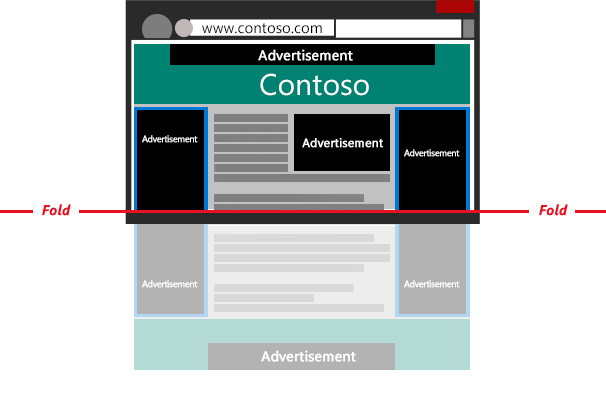
- Websites with content that functions primarily to generate profits from ads.
- Websites created specifically for search engines and feature excessive off-topic keywords or pages with indiscernible text.
- Websites that consistently feature sparse or limited content, particularly where the user would expect to find a range of offers, products or information on a similar site.
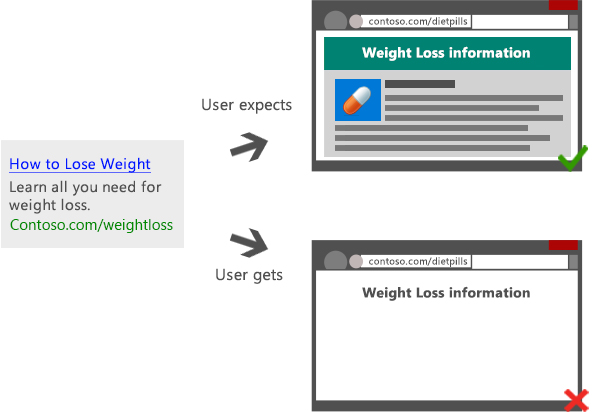
- Websites whose sole purpose is to redirect users to other businesses without adding significant value as an intermediary, e.g., by providing further pricing, product or merchant information.
- Websites that misrepresent the origin or intent of their content and as a result are likely to deceive a portion of the target audience.
- Websites that require the entry of personal information unnecessary for the purposes of providing services or completing a purchase.
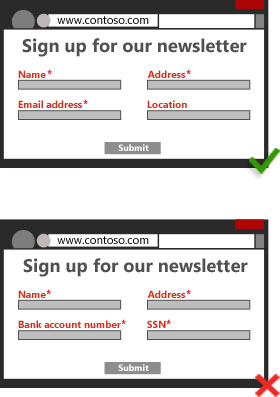
Please note that sites driving users directly to a sign-up or login page must enable the user to link back to the main home page or support pages with services and the terms of use.
- Websites that delay or obstruct the user’s access to requested content, products or services by adding steps designed solely to increase profits.
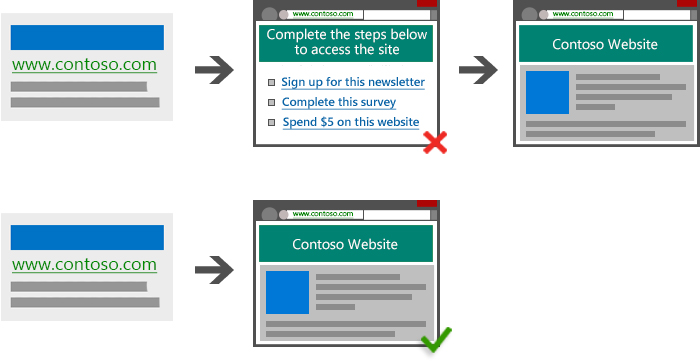
- Websites that employ marketing tactics that might be considered evasive, exaggerated, or potentially confusing.
- It must be noted in the ad copy
- if access to linked content or services requires a software download (e.g., toolbars):
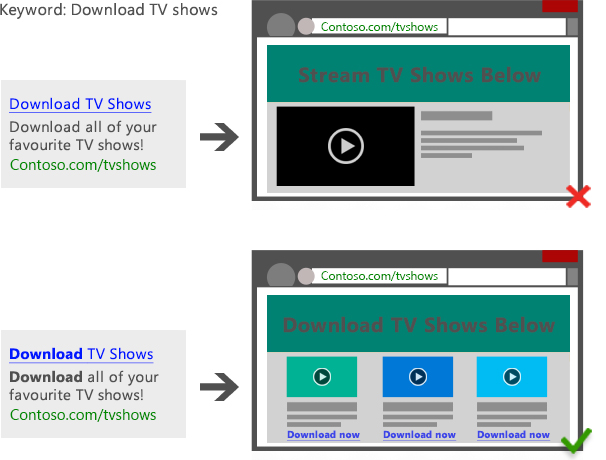
Websites that provide information which the user would expect to be online content but it is delivered in an offline format (such as SMS information services).